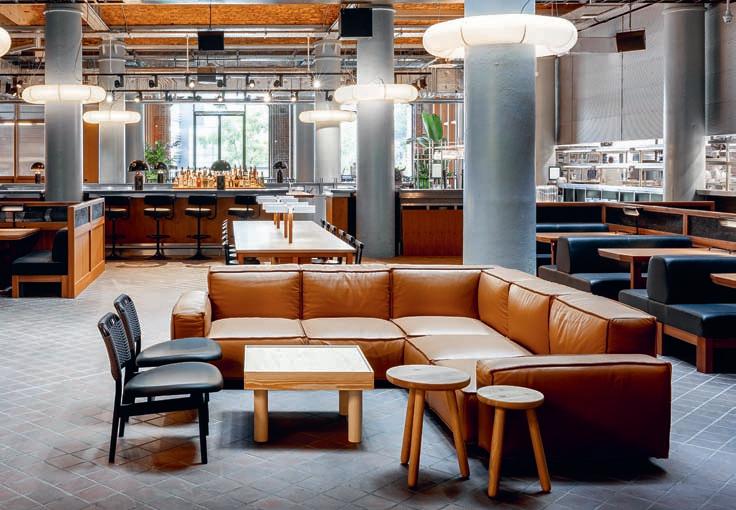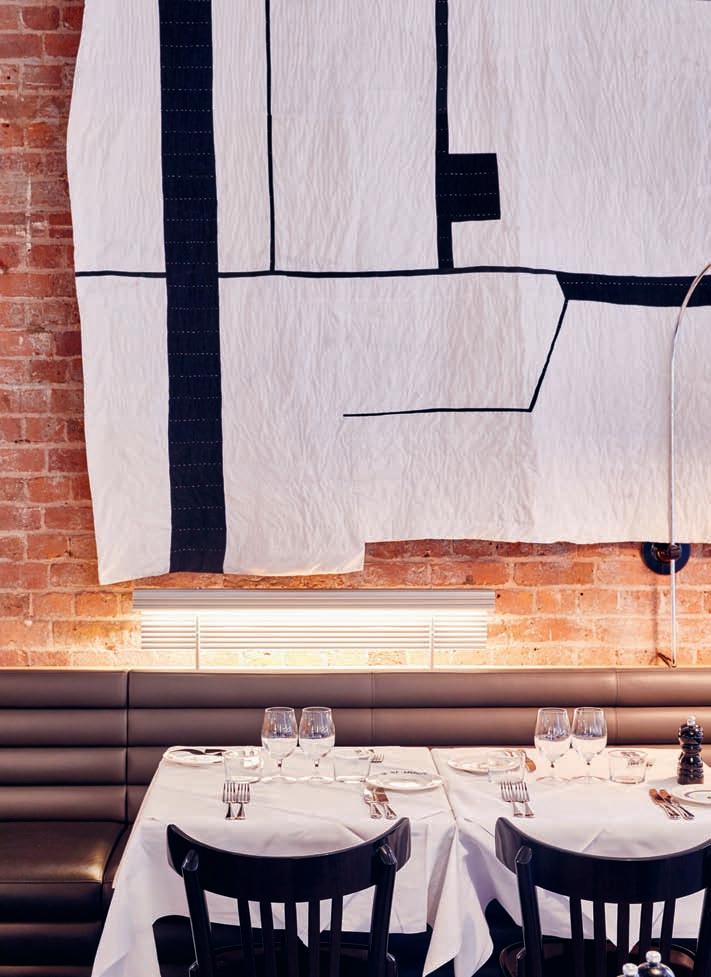
3 minute read
Restaurant, Manchester From the founders of Bistrotheque, a multifunctional place for a good time
Community centre
From the founders of Bistrotheque, Cultureplex threads together Manchester’s industrial past and its booming present
Words Harry McKinley
Left Designed by Love is Enough, Cultureplex includes a lounge for socialising and working, as well as a bar, cinema and restaurant
The city of Manchester’s rapidly evolving, crane-flecked skyline is a sign of the sheer breadth of development that it is currently experiencing. At ground level, glossy new facades are being unfurled at speed, while vast hoardings swaddle streets, teasing the hotels, restaurants and cultural venues still in the pipeline. Once defined by industry, Manchester seems to be industriously remaking itself: a swelling metropolis that now ranks as one of the fastest-growing urban areas in Europe.
Against this backdrop of swift change arrives Cultureplex, a project both majestic in scope and meticulous in detail. As the name suggests, it is a modern and multifunctional jigsaw of a concept, which sees a lounge, restaurant, cafe, bar and boutique cinema slot together within a Grade-II listed former warehouse behind Piccadilly station. Founders David Waddington and Pablo Flack may have cut their cloth in London – with Bistrotheque and Hoi Polloi at Ace Hotel – but Cultureplex is not merely a project for Manchester, but of Manchester. The restaurant, also called Bistrotheque, may share a name with its Bethnal Green sibling, but it’s far from a cut and paste job.
“Conceptually they’re similar because both are about reclaiming and celebrating old industrial buildings, but physically they’re very different,” explains Flack. “Really, only the chairs and how the tables are laid are the same. Everything else can follow its own path – as long it follows common sense and good taste.” The rest of the project isn’t subject to comparison; it is its own Manchester-centric beast.

Left Cultureplex’s design celebrates the building’s industrial heritage
Facing page Bistrotheque, the sister restaurant to its namesake in east London
Ace Hotel alumnus Loren Daye and her New York studio Love is Enough collaborated on the design, devising an aesthetic that reflects the city’s heritage as well as its contemporary, progressive thrust. For inspiration, she looked not to hospitality spaces but to railway stations, public squares and libraries: places of transport, cultural exchange and municipality that share a common social thread with Cultureplex’s 19th-century architectural surrounds.
“We met fabricators and makers first and then let the design follow,” she says. “It’s best to seek out partners without preconceived notions about where the project is going – with just a loose sense of atmosphere. We felt it should be a public place for all ages; letting it unfold and be informed by context, location and origin was the most intuitive way of working.”
The result is a layered design that feels robust, democratic and allied to the region. Quarrytile flooring comes courtesy of Ketley Brick, while the terrazzo station counters fashioned from salvaged local bricks are the work of Granby Workshop, the Liverpool-based studio set up by Assemble architects. The polished sky-blue tiles at Klatch (Cultureplex’s coffee shop) are by Blackburn’s Darwen Terracotta, one of the oldest tile-making companies in the country. There are international flourishes, too, such as the Ingo Maurer light fixtures, to convey a sense of intentioned worldliness, apt for the Manchester of today.
Waddington says that “the story is a response to the building: a warehouse made of brick, iron and northern determination. You can’t get more Mancunian than that.”
Of course, beyond the superficial, Cultureplex aims to root itself in the city by connecting to its people. Local producer Katie Popperwell has devised an ongoing programme that seeks to inspire and support the city’s creatives – from workshops to cultural events – while Flack, on the other hand, is keen to tap in to Manchester’s burgeoning culinary prominence.
“Like east London before it, Manchester has started to surf the crest of a new food wave, one that will lead to exponential growth in exciting independents and change its gastronomic landscape forever,” he explains. “I’m talking about places like Pollen, Cloudwater, Track, Siop Shop, Mana, Sugo, Erst…if we can become a hangout for the people who work in those places, then we’ll be happy.”











